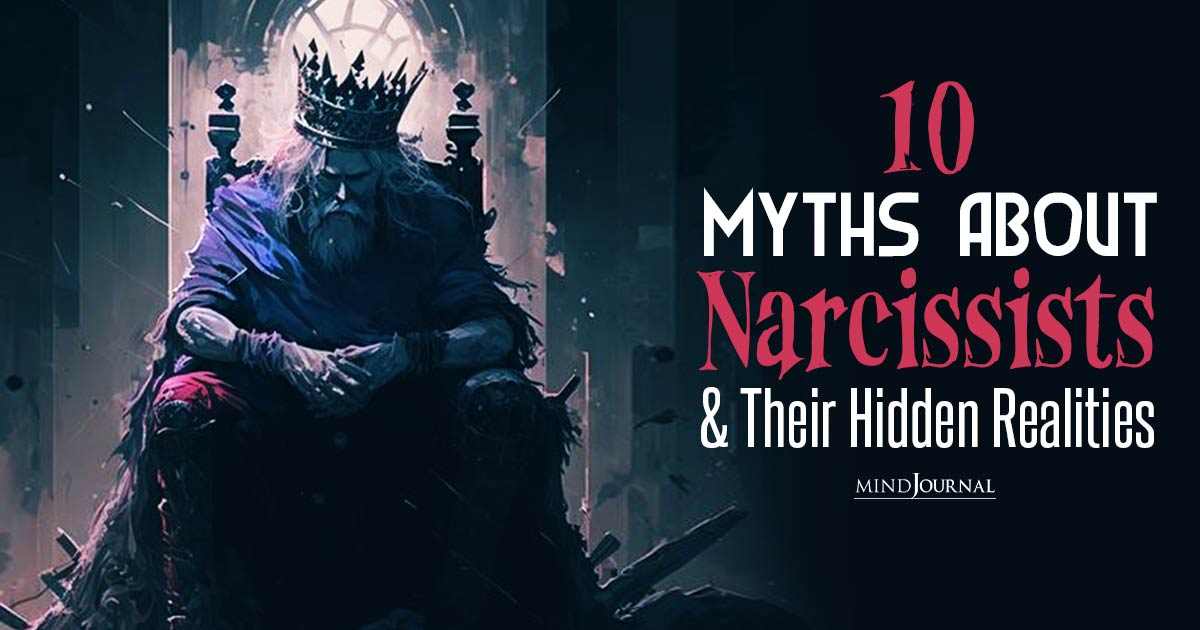Are narcissists really toxic? Or things might not be as black and white as they seem? Let’s dig into some common myths about narcissists, and I’ll break down why understanding them could be pretty useful.
Often shrouded in mystique and misconceptions, narcissism has become a subject of fascination and speculation, largely due to its portrayal in media and pop culture.
Yet, beneath the surface of this intricate personality trait lies the truth about narcissists and the complex interplay of psychological factors that often remain misunderstood.
By peeling away the layers of myths about narcissists, we will gain a clearer understanding of what narcissism truly entails and foster a more informed and empathetic perspective.
Are you ready to delve into the narcissist truths and debunk the myths surrounding and their psychological makeup? Let’s go!
Read more here: Mental Manipulation: 5 Things A Narcissist Says To Undermine Your Reality
Here Are The 10 Myths About Narcissists
1. Myth 1: They’re All on Cloud 9 About Themselves
Sure, some narcissists strut around like they’re the kings and queens of the universe. But guess what? Others are secretly battling low self-esteem.
These “vulnerable narcissists” put on airs of superiority to protect themselves from feeling inadequate. It’s like they’re constantly chasing other people’s approval to boost their self-worth.
Myth 2: They’re Out to Ruin Lives
While narcissists may not necessarily exhibit the stereotypical image of scheming villains twirling their mustaches, they are far from embodying saintly traits.
Their primary focus revolves around attaining their own desires, often without a full awareness of the potential harm their actions could inflict upon others.
Myth 3: They’re Evil Masterminds
One truth about Narcissists is that it might seem like they have a PhD in manipulation, their actions aren’t always part of an overarching malicious scheme.
Instead, they have become adept at exploiting the vulnerabilities of others for their benefit. Establishing clear boundaries is essential in order to prevent falling victim to their tactics.
Narcissists thrive on blurring the lines between their own needs and those of others. They often use charm, flattery, and a façade of concern to manipulate people into doing what they want.
However, with well-defined boundaries, we can make it clear that our well-being and self-respect take precedence over their tactics.
Myth 4: A Touch of Narcissism is Healthy
While some contend that a modest dose of narcissism can yield benefits, particularly in the realm of business, it’s essential to acknowledge the detrimental repercussions it can entail.
The potential for arrogance, self-centeredness, and manipulative behavior underscores the inherent downsides. Striking a balance between healthy self-confidence and the pitfalls of overconfidence is crucial.
Read more here: How Narcissists Make You Physically Sick and 5 Ways To Restore Your Health
Myth 5: They’re Lone Wolves
While navigating intimate relationships may resemble a complex maze for narcissists, their yearning for affection paradoxically contrasts with their reluctance to reciprocate it.
Surprisingly, beneath their self-centered veneer, narcissists are capable of forming close bonds under specific conditions. These bonds, however, demand a partner of exceptional patience, akin to that of a saint, willing to endure the dynamics of a one-sided affection exchange. I
Myth 6: They’re Empathy-Free
One undeniable Narcissist truth is their capacity to tap into empathy, like just you and I do. They possess the ability to decipher emotions, leveraging this skill as a calculated maneuver to fulfill their objectives.
Thus, the façade of appearing “caring and considerate” serves as a mere instrument in their strategic arsenal. Their comprehension of emotions aligns not with genuine compassion, but with a manipulative scheme to manipulate situations and exploit others.
Myth 8: Blame It on Social Media
One prevalent myths about narcissists suggests that social media possesses magical powers to transmute individuals into narcissistic beings.
However, extensive research highlights that the roots of narcissism delve deeper into upbringing rather than the allure of Instagram hearts.
While it’s true that social platforms provide a virtual stage for these personalities to parade their self-importance, it’s essential to recognize that the seeds of narcissism are sown in early life experiences, familial dynamics, and personal disposition.
Myth 7: They’re Always the Life of the Party
One of the misconceptions about narcissists is that all of them are extroverted charmers. Whereas, a significant portion of them align with the quieter archetype, concealing their self-centered tendencies in the shadows.
These individuals may not readily draw attention, yet their internal preoccupation with their own importance remains profound. Their reserved nature masks a deep-seated craving for admiration and a disregard for others’ emotions.
Myth 9: They’ll Change for You
One of the myths about narcissists is that they can be influenced to change for the sake of a relationship. This assumption is akin to expecting a pet goldfish to hit the jackpot. Although some narcissists recognize their self-centered tendencies, genuine transformation seldom occurs.
While therapy presents a potential avenue for growth, it is no instant solution. The core narcissistic traits are deeply ingrained, necessitating substantial commitment and effort to even consider change.
It’s imperative to understand that transformation is a personal journey for them, and relying solely on their change can lead to disappointment.
Myth 10: They’re Madly in Love With Themselves
You know that myth about narcissists being totally in love with themselves? Well, here’s the surprising part – not all of them are basking in self-love. Some of these folks are actually driven by self-hate, believe it or not. It’s almost like they’re going all out to cover up their own deep-seated insecurities.
Imagine it as the shadowy underbelly of the same self-centered coin. It’s a bit like they’re trying to drown out their inner doubts by being excessively self-absorbed. So, there’s more to the story than meets the eye when it comes to these complex characters.
Got a narcissist in your life? Dealing with their constant need for attention and admiration can be a real headache. The trick is setting boundaries and being patient, especially if you’re in for the long haul.
Read more here: 6 Ways To Prepare When Going No Contact With A Narcissist
Just remember, while understanding where they’re coming from helps, you’re not responsible for changing them. That’s a road they’ve got to navigate themselves.
Disclaimer: This article is for informational purposes only and is not intended as a substitute for professional mental health advice, diagnosis, or treatment. While we strive for accuracy, we do not guarantee the completeness or reliability of the information provided. Readers should always seek guidance from a qualified mental health professional for any concerns regarding their mental well-being.
Frequently Asked Questions (FAQs)
Do narcissists lack self-love?
Despite appearances, the narcissist truth is that they often lack genuine self-love, with excessive self-centeredness to mask insecurities.
What are some common myths about narcissists and narcissism?
One myth is that all narcissists are overtly arrogant; another is that they can’t feel empathy – in reality, narcissism can manifest in various ways, including covert behavior and limited empathy.
What is the brutal truth about narcissism?
Narcissism’s core is fragile self-esteem, leading to manipulative behavior that damages relationships.










Leave a Reply